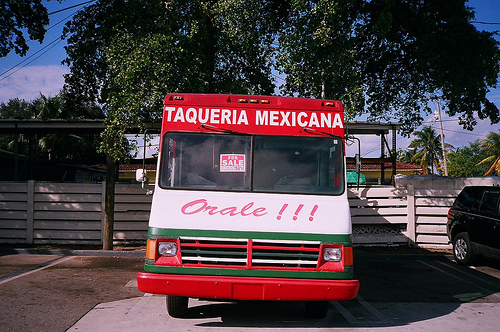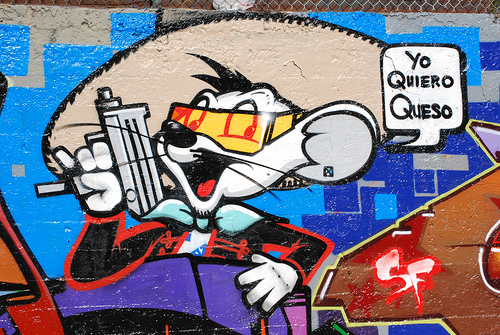Órale
Well, órale actually means a whack of different things and in order to truly understand them in various contexts, you need to step out and take a walk down the streets of Chilangolandia.
 |
| Órale is as Mexican as taco, mezcal, or piñata Photo credit: Phillip Pessar licensed CC BY 2.0 |
So, what the heck does it mean anyway? Órale seems to have little to do with its origins in ahora at first glance. And that shouldn’t bother you either because certain things exist in every language for reasons best left unexplored. Moving on, this word has come to acquire several connotations in Mexican Spanish completely dependent on the context and even the speaker.
One of the ways it’s commonly used is to exhort some action – “let’s go,” “hurry up,” or “come on.”
It’s also often used as an interjection of surprise, excitement, or shock – “wow,” “oh my god.”
Yet another usage is as a term of affirmation or agreement – “yes,” “fine,” “ok,” etc. If you’ve seen the Mexican flick, Amores Perros, you’d have perhaps noticed how Jarocho often uses órale in this sense.
Lastly, it can also function as a standalone greeting, not different from “what’s up” in English. This one is pretty commonly used by the Mexican Americans in the phrase, Órale vato (What’s up, man). The vato in this phrase comes from the gitano lingo as a northern Mexican slang for man.
The fat and famous American stand-up comedian, Gabriel Iglesias loves highlighting his Mexican roots by frequently using órale during his performances. And for the voyeurs in you, there’s Óoorale!, the raunchy gossip magazine sold all over Mexico for ten pesos.
Must you memorize all these forms? Absolutely not! The closest coverall for this term in English would be “whoa.” Typically, wherever you use “whoa” in English, you can use órale in Spanish. Apart from that, it’s best to let the context guide you.
Let some examples illustrate its usage in various contexts:
- ¡Órale güey! (What’s up, dude?)
- Órale, nos vemos a las nueve. (Fine, let’s meet up at nine)
- ¡Órale que no tenemos todo el día! (Hurry up, we don’t have all day!)
- ¡Órale! Es un cuerpo! (Wow! She’s hot!)
- ¡Órale, órale! Dejala en paz, panzón! (Whoa, whoa! Leave her alone, you fatso!)
- Órale pues. (Yeah right / alright then)
As a cue to memory, if you are a wrestling fan, remember Conan, the Mexican wrestler from the days of nWo (New World Order)? Remember how he would pump up the crowd with his órale chants? He used to utter the word at least half a dozen times growing progressively louder, eliciting a public reaction like, “Get up!” or “C’mon!”
Speaking of órale pues, the phrase could also have a subtle sarcastic undertone (something like, “yeah right, whatever”) depending on the context and mood.
Ándale
 |
| Speedy Gonzales: The “fastest mouse in Mexico” Photo credit: Bride of Frankenstein licensed CC BY 2.0 |
Now, just as órale, ándale is a very versatile word. It can pull off a range of different meanings. Almost similar in usage to órale, this word can be used for encouragement, surprise, disappointment, affirmation, etc. depending on the speaker’s mood and tone of voice. We have already seen how it can be used as a shout of encouragement in Speedy’s case. So, basically, you can use ándale almost everywhere you use órale.
Also note that the sense of “hurry up” is conveyed by ándale more so than órale. On the other hand, surprised exclamations take órale better than ándale.
Used with pues, it takes the meaning of, “well, then,” or something similar, not any different from órale pues. Ándale pues or órale pues can be used, for instance, at the closure of an informal conversation as a sign of mutual agreement or understanding. Other than a conversation ender, ándale pues is also an phrase of strong approval, more like, “I totally agree,” or “that’s right.”
Let’s see if these examples illustrate all that ándale means:
- Ándale, vamos al cine. (Alright, let’s go to the movies.)
- ¡Ándale, necesitamos irnos! (Hurry up! We have to leave!)
- ¡Ándale, no eres gorda! (C’mon, you’re not fat!)
As far as ándale pues is concerned, it can also be used in the sense of, “I told you so!” For example, your mom is tired of asking you to study but you never listen and stay up watching TV all night; next day, you have a test which you obviously flunk and return home disappointed. That’s when your mom would say something like, “¿Ves? ¡Te lo dije!” And if she’s Mexican, she’d most likely yell, “¡Ándale! ¡Te lo dije!”
Híjole and others
 |
| Puerto Vallarte: Words like école, úchale, and újule are typical to central Mexico Photo credit: Ann Larie Valentine licensed CC BY-SA 2.0 |
- híjole – This one is similar to “geez,” “oh shit,” “damn,” or “wow” in English; often used to express extreme surprise, shock, exasperation, or desperation. Most often, it corresponds to the English words, “yikes” and “damn.”
- éjele – This is the word you use when you catch someone with their pants down, literally! So, let’s say, you were watching some skin flick and I caught you in the groove; that’s when I might say, “¡Éjele, ya te vi! (Whoa, I just say you!)”
- épale – This one also loosely corresponds to the English usage of “damn” or “wow.” As an imperative, it can also be used to forbid someone from doing something, more or less like the English interjection, “Stop!”
- école – This is a common expression of strong agreement; very similar to how you say, “exactly,” in English when you vehemently agree with what the speaker just mentioned. It sometimes also translates to, “of course!”
- quihúbole – This one comes from the phrase, ¿Qué hubo?, and loosely means, “what’s up?” Also rendered as quihubo, it’s generally used only with someone very familiar.
- újule – This word is used as an expression of disappointment or dismay; it usually introduces something like a bad news.
- úchale – Almost the same as újule, this word is usually an expression of displeasure or disgust.
It’s worth noting that most of these words with a few exceptions like órale, ándale, and híjole, are used in the deep interiors of central Mexico and might sound a tad funny elsewhere, and definitely alien outside of mexico!
















Excellent explanation very well presented. Thank you.
ReplyDeleteExcellent explanation very well presented. Thank you.
ReplyDelete